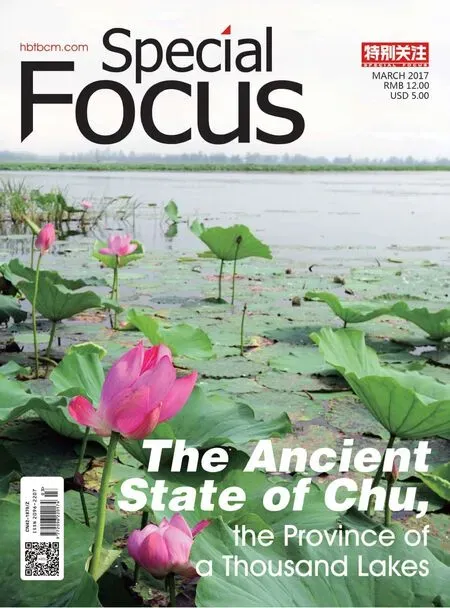From Guatemala to China
By Wang Siyuan
From Guatemala to China
By Wang Siyuan

W hile working on her master’s thesis in an international s t u d e n t s’dormitory in HUST (Huazhong University of Science and Technology), Celia Esquivel couldn’t help checking her phone from time to time. With sweet expectation, she was waiting for her husband’s phone call from Beijing. A decision she made six years ago turned her from a Guatemalan girl into the wife of a man from Wuhan.
Melting into Your Life
The summer six years ago is still fresh in Celia’s mind. At a friend’s birthday party, she met a Chinese student with which she would choose to spend her whole life. The young man was studying in Europe and traveled to her hometown. After the party, they exchanged their phone numbers and started contacting each other every day. When the Chinese student was about to leave, Celia realized that she wanted to stay with him forever.
In her family members’eyes, Celia was a decisive and determined girl. Although they considered the long departure a bit unendurable, they chose to respect and support her. Finally, Celia waved goodbye to her family, friends, unfinished bachelor degree—even her culture and language—and followed her new husband to China.
Life in a totally foreign country is always hard. When Celia suffered from the inevitable culture shock, her husband was always tolerant and considerate. On her first day in China, her new Chinese family prepared spare ribs and lotus root soup for her. The look of the lotus root, the most popular dish in Hubei province, failed to please Celia. She only thought it resembled a spider web. With a big smile on his face, her husband insisted that she should take a bite. It nearly took him the whole evening to persuade the 21-year-old girl to try the strange foreign food, but Celia recalls, “After tasting it, I was surprised.” The lotus root has now became one of her favorites, and she has learned to accept new things with an open mind.

Not only was the Chinese food new to her, so were Chinese eating habits. Once at suppertime, Celia’s motherin-law found her rice bowl was too full. Worrying that eating too much in the evening would make her stomach too full, the mother removed some of the rice with her own chopsticks. However, in Guatemala, such an act is taken as extreme disrespect. She lost her temper at once, which embarrassed the mother.
After she calmed down, her husband explained the cultural difference to her patiently. “Chinese people always consider a family as an inseparable body. And my mother did it because she has accepted you with all her heart.”Celia’s husband also told his mother to give her more time and space. Thanks to his efforts, Celia and her mother-inlaw built a close relationship. They go shopping on weekends hand in hand now.
Entering University Again
Celia had majored in medical science in Guatemala and she hoped to be an excellent doctor there like her father. Coming to China meant abandoning her dream. Although she had no hesitations or regrets, she still missed the university life.
Since she couldn’t speak Chinese at the beginning, Celia had to rely on her husband when out, or stay at home alone. When her husband couldn’t concentrate on her, life started to become inconvenient and lonely. Once, she even fell asleep when her husband chatted with others.
After the Spring Festival in 2011, Celia accompanied her husband to HUST to interview for jobs. Once she stepped onto the campus, she fell in love with the tree-covered university. She grew eager to learn Chinese and become a college student again.
In September, 2011, Celia became a freshman in HUST, majoring in Chinese. Celia appreciated the chance to learn Chinese systematically and formally, from Chinese characters to words to sentences and chapters; she enjoyed the process of improving her skills. She bought guidebooks and worked on them every day; her husband would help her with difficulties she had.
Life in University was full of fun for Celia. Celia went to lectures, watched performances, joined clubs, and participated in celebrations and university activities to learn Chinese culture and make friends. After two years, she could understand Chinese TV series and speak Chinese fluently.She also passed HSK 6 (The highest level of the standardized Chinese test) before her graduation. Fully aware of the inconvenience caused by language barriers, when Celia met new international students from South America, she would volunteer to be their interpreter and guide. Those students gave her the nickname: mother.
In October, 2013, China Education Expo was held in Wuhan. When one of the sponsors found it was hard to find a Spanish interpreter for the Columbian visitors, Celia was recommended by her teacher. She finished her task smoothly and her love for China grew even deeper. She had a dream to stay in HUST and get her master’s degree—she now wanted to join Chinese classes.
In September, 2015, Celia became a graduate student in the School of Management, majoring in enterprise management. What’s more, she acquired a CSC scholarship. Her time spent in China has been a whirlwind of learning and change.
A Home in China
During her six years in China, Celia has only gone back to her hometown three times. The most recent time was for her master thesis. “The thesis is about Guatemala, so I hoped to collect some first-hand materials there—handing out questionnaires and doing some interviews.”


Celia didn’t return to Guatemala for over one year after arriving in China. However, after just a fortnight there, she decided not to go back again, except for special occasions. “When I returned to China, I found it was really hard to adapt, and my Chinese skills had decreased a lot. So I dared not to go back.” Also, Guatemala hasn’t built a diplomatic relationship with China yet, so the procedure of going back is complicated, which would certainly interrupt her life here.
Celia really misses the pure blue sky, the golden sunshine, the flourishing tropical plants, and the black beans (their staple food); however, she chooses to put them in her heart. Since her husband is here, she considers China as her home.
As an active girl, Celia used to enjoy a casual and relaxed lifestyle. When she started learning Chinese, she found she couldn’t sit still for long doing exercises. When her husband asked her to hold on and learn more, she would make protests. However, once she decided China was her home, she started to deeply enjoy learning and challenging herself. She understood that the market for Spanish translators and interpreters is competitive, and improving her competence was crucial.
With her husband working in Beijing, Celia suffered frequent departures at the beginning of their marriage. She didn’t mind because she knew they were still young and still had many things worth striving for.“Although I wanted to stay with him, I want him to concentrate on his job while I concentrated on my study.” Life is long and beautiful, she isn’t so eager to skip to next chapter.

